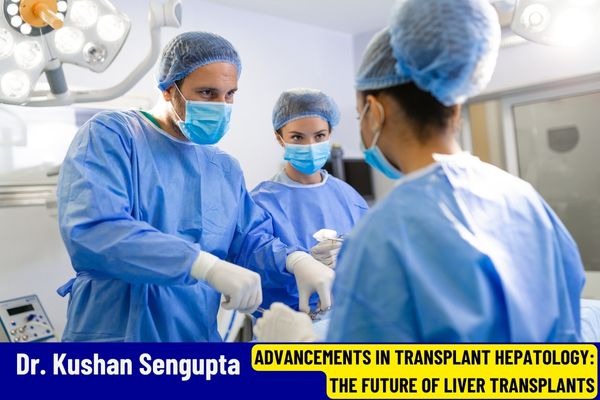Advancements in Transplant Hepatology: The Future of Liver Transplants
Liver transplantation has evolved significantly over the years, improving survival rates and quality of life for patients with liver failure. This blog explores the latest advancements in transplant hepatology, from cutting-edge surgical techniques to innovative immunosuppressive therapies, offering a glimpse into the future of liver transplants.


Advancements in Transplant Hepatology: The Future of Liver Transplants with Dr. Kushan Sengupta
Liver transplantation remains the only curative option for patients with end-stage liver disease, acute liver failure, and certain types of liver cancer. However, the field of transplant hepatology is rapidly evolving, offering new hope to patients through improved surgical techniques, enhanced donor organ preservation, and cutting-edge post-transplant care. Dr. Kushan Sengupta, a leading expert in liver transplantation, shares insights into the most recent advancements transforming the future of liver transplants.
1. Minimally Invasive and Robotic-Assisted Liver Transplants
Traditional liver transplant surgeries involve large incisions and extended recovery periods. However, minimally invasive techniques and robotic-assisted surgeries are revolutionizing the field. These approaches lead to smaller incisions, reduced complications, shorter hospital stays, and faster recovery for patients.
2. Living Donor and Split-Liver Transplants
The shortage of deceased donor livers has led to increased reliance on living donor liver transplants (LDLT) and split-liver transplantation. In LDLT, a healthy individual donates a portion of their liver, which regenerates in both the donor and recipient. Split-liver transplantation allows one donor liver to be used for two patients, maximizing organ availability and saving more lives.
3. Machine Perfusion Technology: Extending Organ Viability
One of the biggest challenges in liver transplantation is organ preservation. Traditionally, donor livers are stored in cold preservation, which limits the time they remain viable. Machine perfusion technology is a game-changer, as it keeps the liver functioning outside the body, reducing organ damage, improving transplant success rates, and making previously unusable livers viable for transplant.
4. Stem Cell Therapy and Regenerative Medicine
Regenerative medicine is pushing the boundaries of liver treatment. Stem cell therapy is being explored as a potential method to repair liver damage, potentially delaying or even eliminating the need for transplantation in some cases. Additionally, researchers are developing bioengineered liver tissues, which could become a reality in the future.
5. Improved Immunosuppression and Personalized Medicine
After a liver transplant, patients need immunosuppressive medications to prevent rejection. However, long-term use of these drugs can cause complications. New advancements in targeted immunosuppression and precision medicine are helping doctors tailor treatments based on a patient’s genetic makeup, reducing side effects and improving long-term outcomes.
6. Artificial and Bioengineered Livers: The Future of Transplantation
With organ shortages being a global issue, researchers are working on bioartificial livers and 3D-printed liver tissues. These technologies could serve as a bridge for patients waiting for transplants or even become a full-fledged alternative to traditional organ transplantation in the future.
7. The Role of AI in Liver Transplantation
Artificial intelligence (AI) and machine learning are now being used to improve donor-recipient matching, predict post-transplant complications, and optimize patient management. AI-driven diagnostics can help identify the best treatment strategies and improve long-term survival rates.
Final Thoughts
The field of transplant hepatology is undergoing a remarkable transformation, offering new possibilities for patients with liver disease. With cutting-edge surgical advancements, regenerative medicine, and AI-driven innovations, the future of liver transplants looks more promising than ever.
Dr. Kushan Sengupta continues to be at the forefront of these advancements, ensuring that patients receive the best possible care. If you or a loved one is considering a liver transplant, consulting a specialist like Dr. Sengupta can help navigate the latest treatment options available.